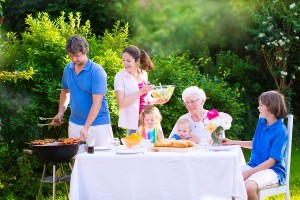With the warm weather upon us, at last, it’s time to rip the shrouds off our grills and get to cooking. But before we fire up those BBQs and slap down the burgers, we should take a few minutes to remember that outdoor cooking carries a few hazards, and we would rather not create any Homer Simpson moments by going soft on our accident prevention systems.
According to the National Fire Protection Association, unsafe grilling accounts for about 8,800 home fires annually, and in 2012, the last year for which this statistic is available, 16,900 people sustained burns significant enough to require a trip to the hospital. Let’s not add to those statistics — not only for the obvious reasons, but also to avoid making insurance claims that could have been averted with just a little common sense and by adhering to the following safety tips.
For Gas Grills:
1. Use your nose. Propane will have a distinct odor, and if you smell it, turn off the burners, close the tank valve and DO NOT light a match. Until you identify the source of the leak and replace the offending part, your grill is off limits.
2.. Check for leaks. To do this, whip up a bowl of soapy water and coat both the tank and the connecting hose with it. A leak will show by bubbling at the source. If nothing leaks, great! Rinse and you also have a clean tank and hose.
3. Open the lid before lighting. If you leave it closed (because it’s windy, maybe), you are setting yourself up for a potential explosion blowing the lid off or flames onto you. At best, you might ruin your grill and your favorite boss apron; at worst you, or some unfortunate nearby, may be seriously injured, if not killed. Grill, don’t kill.
4. Give combustible materials a wide berth. Make sure your grill is far enough away from siding, furniture, patio enclosures and whatever else might catch fire if your delicious rib eyes flare up. A little char on the meat might be tasty proof of your talent as a grillmeister, but burning down the house will land you in the BBQ Hall of Shame.
5. Turn off the burners and tank valve as soon as you’re done cooking. Leaving the burners going and the tank open not only wastes your precious propane, leading to an empty tank when you least expect it, but if the flame goes out, the gas will build up. One little spark and your party may go up in smoke.
For Charcoal Grills:
1. Pay attention to what surrounds the grill. If you wouldn’t light a campfire or your fire pit in the spot where you parked your grill, move your grill farther away. Banish it from anything that can catch fire and, yes, this includes your mother-in-law.
2. Remember that the coals stay hot almost forever. Well, maybe not quite that long, but they can stay hot for days, even weeks, in the right conditions. Long after you’ve grilled your meal and toasted marshmallows, those coals can remain hot enough to start a fire. So, if you need to clean out the old coals and ash, never use a paper bag or plastic containers. You may not detect the smoldering coal deep in the ash, but it will grab the attention of your fire department if your trash bin ignites.
3. Go easy on the lighter fluid. Remember, NASA isn’t asking you to send your BBQ to the space station, so be moderate with the lighter fluid, if you need to use it at all. It’s now the 21st century where you can buy self-starting briquettes, rendering the can of fluid obsolete. They cost a bit more, but they are absolutely worth it.
For Both:
1. Clean that baby once in a while. Like little children, grills need you to wipe off the grease once in a while. A good plan is to keep one of those wire brushes nearby and use it on the grates before each use. Grease and food bit build-up is flammable, not to mention unappetizing, especially on your BBQ.
2. Go play outside — only. If you grill year-round, you know you’ve been tempted to move your BBQ into the garage. Never, ever in a million years should you light a grill indoors. Not only are you too close to combustibles, but your grill exhales carbon monoxide when in use. Of course, if you’re dead from CO2 poisoning, you may not notice your house going up in flames, but your neighbors will. So, don’t do it. Ever. We mean it.
3. Check for rust-out. Both gas and charcoal grills rust out on the bottom eventually. Once the bottom of the unit wears thin, it’s time to send it to BBQ heaven and adopt a new one. Imagine hot briquettes or lava rocks plunging to your nice cedar deck and starting a fire, or dropping on your feet, for that matter. So, keep an eye out for rust slag on the pan and don’t push your luck.
By simply minding these easy tips for grilling safety, your outdoor cooking will go off without a hitch. Grill safe or grill home.

